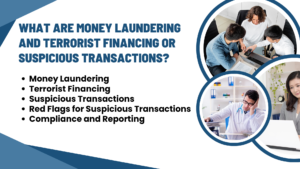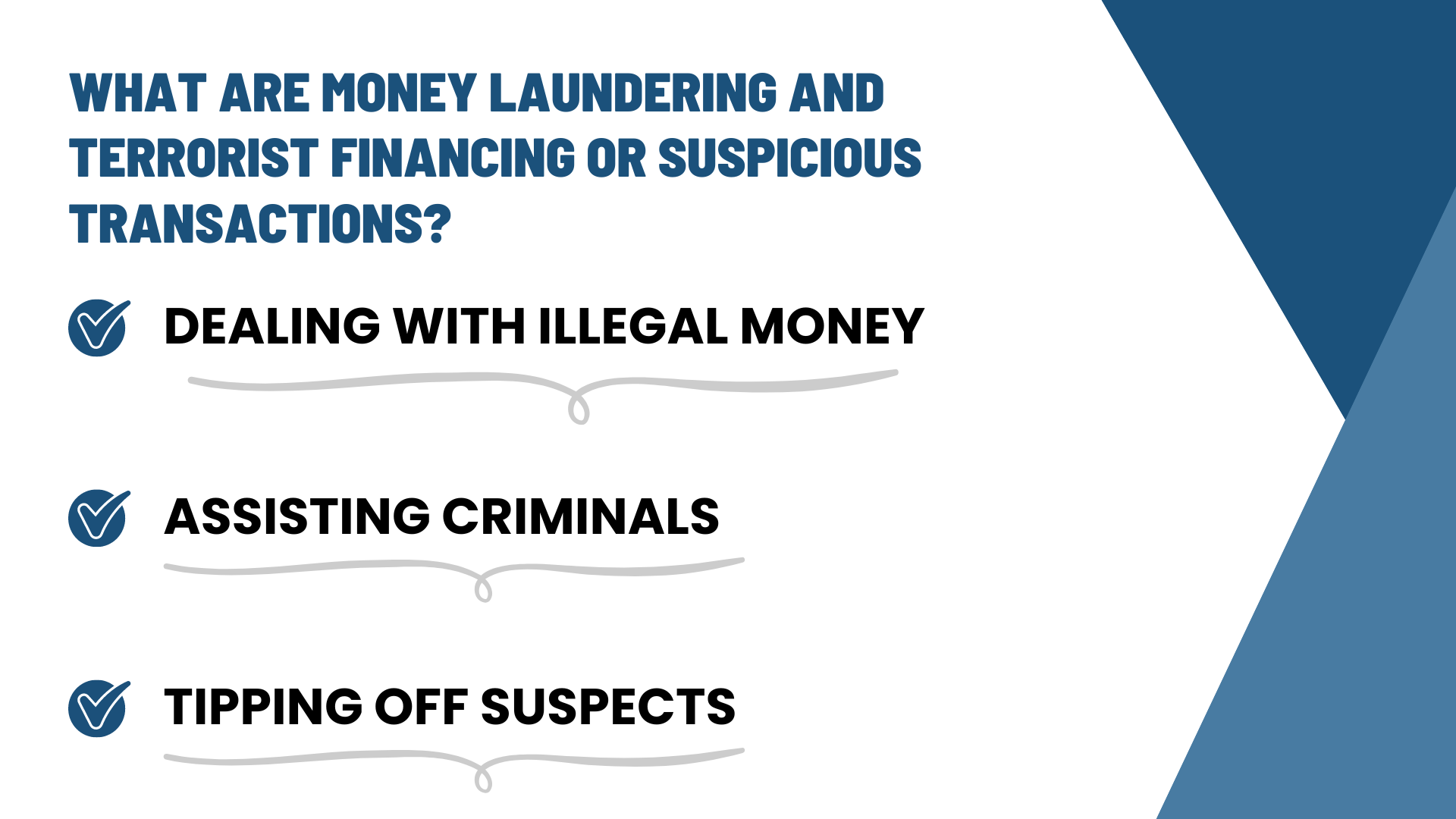What is Money Laundering, Terrorist Financing, and Suspicious Transactions in Singapore?
Singapore has made money laundering, terrorist financing, and other suspicious transactions illegal and has taken strict action against these activities. However, what do these vices mean? Understanding them would make it easy for even a layman to identify them. Consequently, it would be possible to file the Suspicious Transactions Reports (SRT) as soon as possible preferable before it occurs.
Money laundering involves the pretense of doing legitimate business, but the reality is the money is coming from illegal activities. The culprits have a way of making it appear as though everything is within the legal guidelines. Under such circumstances, the regulatory authorities may not see the need to scrutinize the business. In most cases, it is about taking the illegally gained money and transferring it to a series and company that follow the rules.
A good example is a drug lord who ventures into real estate. The money used to construct properties is part of illegal profits. However, the money will seem legally obtained once he rents them out.
On the other hand, terrorist financing is as straightforward as it appears. It involves sending money to a terrorist group to finance their terrorist activities. People who transact with terrorists or deal with them in any way fall under this category too. Sometimes, it may be a form of money laundering. For instance, helping a terrorist clean his money is money laundering to a great extent.
Identifying Suspicious Transactions in Singapore: Red Flags for Businesses and Individuals.
In the highly regulated financial world of Singapore, detection of suspicious transactions plays a critical role for business and individuals alike to stay within the AML/CFT regulation. The Monetary Authority of Singapore (MAS) through its AML/CFT guidelines requires that financial institutions, fund managers, and even non-financial businesses should be on the lookout for suspicious activity in order to report the same.
A suspicious transaction is any transaction involving processing of funds or money which feels out of place with the known profile of a customer, has no lawful purpose, or is designed in a way to evade regulatory scrutiny. These transactions could be connected with money laundering, terrorist financing, proliferation financing, or another type of financial crime in Singapore.
Common red flags include:
- Large sudden deposits or withdrawals of cash without economic reason.
- Designing transactions such that they fall below regulatory reporting levels.
- Reluctant clients with the necessary Customer Due Diligence (CDD) documentations.
- Dealings with high-risk jurisdictions or with the Politically Exposed Persons (PEPs).
- Too complex corporate structure that obscures beneficial ownership
- Strange patterns of payments, such as transferring the funds into accounts of not associated third parties к
- Such activities also have to be reported by both businesses and individuals using a Suspicious Transaction Report (STR) to Singapore’s Office of Suspicious Transaction (STRO), which is under the Financial Intelligence Unit (FIU).
Lack of acknowledgment or notification of suspicious transfers may be subject to penalties in terms of Singapore’s CDSA and TSOFA acts. With an understanding of these suspicious transaction indicators, businesses build their internal controls and minimize their exposure risk in the rapidly changing fin
Understanding Money Laundering and Terrorist Financing Under Singapore AML/CFT Laws
Singapore has made money laundering, terrorist financing, and suspicious transactions illegal under its robust AML/CFT Singapore laws, such as the Corruption, Drug Trafficking and Other Serious Crimes (Confiscation of Benefits) Act (CDSA) and the Terrorism (Suppression of Financing) Act (TSOFA). These acts align with MAS AML/CFT Guidelines Singapore, helping to combat financial crime effectively.
- Dealing with Illegal Money – Financial Crime Risks in Singapore
The money may be from drugs or other criminal activities. You will get into trouble if you transfer, conceal, use, possess or acquire such money knowingly. The price to pay for the involvement is a 10-year jail term or a fine of S500 000 if you are an individual. However, the penalty for a business is up to S$1 million and, in some cases, twice the amount in question.
- Assisting Criminals – Obligation to Report Suspicious Transactions
Upon identifying a suspicious transaction, you need to inform the authorities. Failure to do so will assist the criminals in retaining the money. Some assistance could cost you ten years you would spend in jail or a fine of S500 000. However, the fine for a business is up to S$1 million and, in some cases, twice the amount in question.
Tipping Off Suspects – Red Flags for Financial Crime
Don’t update any suspect with information regarding the investigation. After all, the criminal may tamper with evidence hence going scot-free eventually. Doing so will see you pay a fine of S$250,000 or a three-year jail term.
- Not Reporting a Suspicious Transaction – STR and CDD Responsibilities
Failure to disclose will cost the company a fine of about S$500,000. As an individual, the penalty will be about $250,000 or 3 years imprisonment.
How to Report Suspicious Transactions in Singapore
In Singapore, World Bank requires that reporting of any suspicious transaction is a prerequisite that is legally binding under the Corruption, Drug Trafficking and Other Serious Crimes (Confiscation of Benefits) Act (CDSA) and the Terrorism (Suppression of Financing) Act (TSOFA). All the businesses and individuals, especially those with regulated operational fields, such as finance, real estate, legal, and corporate services, are required to submit a Suspicious Transaction Report (STR) in the event when they identify a suspicious financial activity.
The office that is mandated to deal with the STRs is Suspicious Transaction Reporting Office (STRO) which comes under the Singapore Financial Intelligence Unit (FIU). After a red flag or a suspicious transaction indicator is identified, an STR must be filed as soon as possible ; delays can result in penalties or prosecution.
Suspicious transaction reporting in Singapore:
1. Access STRO Online: From SONAR Portal, use the STRO Online Notices and Reporting Platform (SONAR).
2. Submit the STR Form: Give details as the nature of the transaction, the involved parties, dates, amounts, and your reason for suspicion.
3. Maintain Confidentiality: It is a crime to provide the tip-off to the subject of the STR. Nothing should be discussed with anyone about what is happening.
4. Keep Records: Keep all the supporting documents and reports as necessary under AML/CFT compliance obligations.
The businesses should train employees to identify and report suspicious activity in time. By taking these steps and meeting your AML/CFT requirements, you contribute to preventing the money laundering and the terrorist financing as well as other grave financial crimes of Singapore’s financial system.
Conclusion
In today’s regulatory landscape suspicious transactions is essential. The risk-based approach to AML/CFT compliance in Singapore ensures your business avoids costly penalties, legal consequences, and reputational damage. Whether you’re an individual or financial institution, compliance with MAS AML/CFT guidelines protects you and the integrity of Singapore’s financial system.






